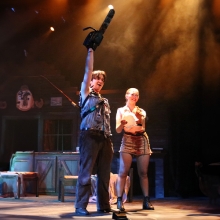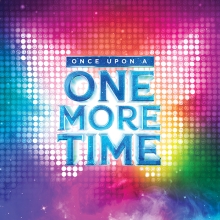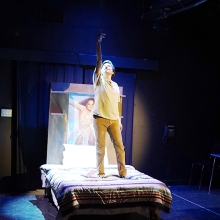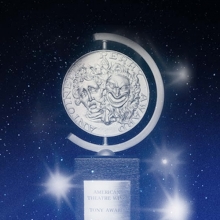During the summer, MTI's office will close at 3 PM ET on Fridays. On Friday, August 30th, the office will close at 1 PM ET for the Labor Day holiday weekend.
Filichia Features: A “New” Show for Mermanesque Performers
Filichia Features: A “New” Show for Mermanesque Performers
When my New Jersey travels took me to Plays in the Park in Edison for Nunsense, I was overwhelmed by the power-packed performance of Susan Speidel – and told the director afterward.
“Oh, yes,” she said. “Susie’s our Ethel Merman.”
When my Arizona travels took me to The 3rd St. Theatre in Phoenix for Minnie’s Boys, I was overwhelmed by the terrific performance of Carolyn Pain – and told the director afterward.
“Oh, yes,” he said. “Carolyn’s our Ethel Merman.”
Does every community theater have an Ethel Merman? If you indeed do have a brass diva on hand, think about starring yours in Happy Hunting.
Never heard of it? The topical 1956 musical was set in Monaco on the eve of “The Wedding of the Century” between actress Grace Kelly and the country’s Prince Rainier. Neither she nor he remotely appears in the musical, however; perhaps they didn’t dare for fear of being bulldozed by Liz Livingstone (Merman, of course).
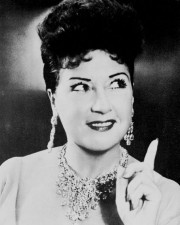 The brass-tacks Liz hails from rustic Colorado but married into Philadelphia Main Line society. Her daughter Beth refers to her as “The best businessman in Philadelphia,” and the young woman has a point: Liz turned her husband's $4 million into $40 million.
The brass-tacks Liz hails from rustic Colorado but married into Philadelphia Main Line society. Her daughter Beth refers to her as “The best businessman in Philadelphia,” and the young woman has a point: Liz turned her husband's $4 million into $40 million.
Once Mr. Livingstone died, however, everyone felt free to shun Liz, whom they viewed as a parvenu. Now Liz is hoping to attend the big wedding so that Beth might meet and marry someone as princely as Rainier. Hmmm, that handsome Duke over there would do nicely ...
Trouble is, Beth is already taken with Sandy, a nice guy and a lawyer -- “a Philadelphia lawyer,” he proudly proclaims – but still a commoner.
Actually, the young people’s budding romance might be a blessing in disguise, because the more Liz comes to know the Duke, the more she’s attracted to him. When he tells her that he's a pretender to the Spanish throne, she says with sincerity "I like you all the more for admitting it." For Liz hates those who act pretentiously. If you put on airs, you foul the air around her.
At first, the Duke is indeed interested in Beth, because -- you know royalty – he’s impoverished. His motive isn’t as callous as it may sound, for back then, the European view of marriage was seen as a merger rather than a love-match; Americans were the ones intent on, to quote a song from an earlier Merman musical, “marrying for love.”
So the Duke isn’t a gigolo; he’s simply following in the traditional footsteps of every European husband that he’s even seen. We get the impression that if he had his way, he’d marry Liz. And when he makes that clear, Liz assumes that he must be turning down her younger and prettier daughter because mother controls the purse strings.
All is quickly patched up when word arrives that political circumstances have now made the Duke the next King of Spain. Mirroring an event that had taken place in England almost 20 years earlier to the day, the Duke abdicates for the woman he loves. Now Liz has no doubt that he’s sincere. Bring on the double wedding!
Bookwriters Howard Lindsay and Russel Crouse had already written three Merman vehicles: Anything Goes; Red, Hot and Blue! and Call Me Madam. Thus, they knew how to create a quintessential character for her to play: a self-made woman who’s never lost the common touch. She's proud of her ability to spit between her teeth, which she’d rather have than a working knowledge of politics and art. She doesn't understand any foreign words, because plain English is good enough for her. Liz is a banner-carrier for one of American literature’s favorite themes: “I’m as good as you are, and don’t you forget it.”
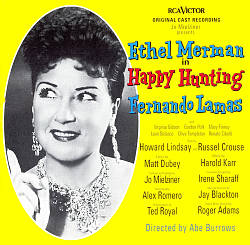 So Liz directly addresses Philadelphia’s Main Line wives as “Girls,” speaks in sports imagery (“Make sure it isn't a wild pitch” … “It’s 8-to-5 she can’t get it”), is able to hold her liquor ("Make it a double") and is a down-home hostess (“Come and get it”). Add to these the expressions as “I’m gonna level with you” and “Scram!” and you have the essence of Liz and Merman, too.
So Liz directly addresses Philadelphia’s Main Line wives as “Girls,” speaks in sports imagery (“Make sure it isn't a wild pitch” … “It’s 8-to-5 she can’t get it”), is able to hold her liquor ("Make it a double") and is a down-home hostess (“Come and get it”). Add to these the expressions as “I’m gonna level with you” and “Scram!” and you have the essence of Liz and Merman, too.
Lyricist Matt Dubey also knew how to get into the act. “Now you’re talking!” he has Liz proclaim when she realizes “This Is What I Call Love.” In addition, this song has her judge a less-than-passionate romance as “amateur night.” And when Dubey wrote the song “I’m a Funny Dame,” he carefully chose the last word of that title. Liz certainly is a dame – not, of course, in the British sense, but definitely in the fine, upstanding, patriotic, healthy, normal American way.
But when one of Liz’s friends tries to one-up a Philadelphia dowager – only to have the matron trump her ace with a more cutting remark -- Lindsay and Crouse have Liz state with admiration, “Damn it, you’ve got to admit it: they’ve got something.” Liz doesn't know Oscar Wilde, of course, but she lives and breathes his famous line in The Importance of Being Earnest: “Never speak disrespectfully of society … Only people who can't get into it do that.”
Late in the show, when Liz decides that she is indeed interested in the Duke, she takes advice from her so-called best friend: act feminine. But the Duke doesn’t respond to her fluttery eyelashes and coquettish smile. He loves her for what she is – which is the type of relationship we’re all looking for.
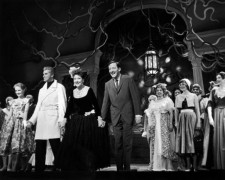 Happy Hunting ran 412 performances, one week shy of a year in a time when that represented a good, healthy run. Because it was one of the rare Merman’s shows to close at a financial deficit – and because she hated her leading man who hated her, too – she would always bad-mouth it.
Happy Hunting ran 412 performances, one week shy of a year in a time when that represented a good, healthy run. Because it was one of the rare Merman’s shows to close at a financial deficit – and because she hated her leading man who hated her, too – she would always bad-mouth it.
But as the York Theatre Company proved last weekend in its Musicals in Mufti series, there’s plenty to like in Happy Hunting. That was especially true because director David Glenn Armstrong certainly had his Ethel Merman on hand: no less than Klea Blackhurst, an Ethel look-alike who rose to prominence a dozen years ago by doing a tribute show to The Merm called Everything the Traffic Will Allow. (As I wrote at the time: “Blackhurst should play the Broadhurst!”)
And yet, Blackhurst and Armstrong were smart enough not to put on stage a photocopy of Merman. Many pitchmen urge us to “accept no imitation,” and we didn’t have to accept one here. Blackhurst gave us her personal take on the role, never losing herself by being swallowed by the legend’s ghost. Blackhurst wasn’t Merman, but Mermanesque – there is a difference – which still left plenty to enchant us. She had the crowd on her side as soon as she sang her first number, “Gee, But It’s Good to Be Here.” Merman liked it well enough that she chose it to open many of her concert appearances.
The rest of the score? Dubey and composer Harold Karr were writing in the ‘50s, which was a prime time for semi-crazy-sounding novelty songs. They came up with “If’n,” in which Beth defends a part of speech that isn’t part of Sandy’s vocabulary.
Karr’s work suggests that he’s been listening to this new-fangled rock 'n' roll, as rock used to be called. There’s a hint of it in “Don’t Tell Me,” in which Sandy tries to place Beth, and in “Mutual Admiration Society,” the score’s hit song in which Liz and Beth show how much they love each other. The rest of the score is in the mid-century Broadway mode and makes for pleasant listening.
Before you sign any contracts, be apprised that Happy Hunting requires three animals: a lap dog, a fox and a horse. Armstrong had cute little cut-outs for the first two, which worked, because they only have cameos. But the horse is a genuine character: Daisy, whom Liz begs to be nice to her when she must ride her tomorrow in a foxhunt.
In the original production, a highly trained horse nodded "yes" or shook her head "no" to each of Liz’s questions and comments. Later, when Liz started doubting herself and rhetorically asked “He’s the only man I ever loved and I’ve fixed it so he has to marry someone else. What does that make me?” Daisy made her own editorial comment by turning around and showing her backside.
You’re saying, “It’s not that trained horses don’t grow on trees; they can barely be found in stables. How can I circumvent this problem to get in that last good joke?” Armstrong solved it by having two chorus girls trot out pretending to be a horse, with the front lass wearing a cutout of a horse's head, and the secondary miss deigning to wear a tail.
So there’s quite a fit of fun to be had here. Happy Hunting also suffered because it bore a great resemblance to Merman’s previous hit: Call Me Madam, which also had her as a fish out of American waters plunked into European ones. Both had Merman wind up with a high-ranking European, and had her rubbing elbows with a young button-down, straight-arrow bureaucrat. And if that didn’t make the plot feel a tad threadbare, the show also had the misfortune to open only 36 days after Auntie Mame – with a plot that had a down-to-earth woman run the risk of crashing down to earth, thanks to a horse who’s not in the mood for a foxhunt.
But enough time and distance have passed that these 1956 issues won’t be barriers to your audiences having a great time in 2013 and beyond. And if you’re intrigued enough to examine Happy Hunting but fear that you don’t have the right Mermanesque type on hand, may I recommend Susan Speidel, Carolyn Pain or Klea Blackhurst?
 Read all of Filichia’s Features!
Read all of Filichia’s Features!
Visit Peter’s Official Website.
Check out Peter’s weekly column each Tuesday at www.masterworksbroadway.com and each Friday at www.kritzerland.com.
Peter’s newest book, Strippers, Showgirls, and Sharks: A Very Opinionated History of the Broadway Musicals That Did Not Win the Tony Award, is available for pre-order NOW!
Share
Callboard
-
Shake and shimmy it with the #Hairspray20Challenge! Join MTI and Broadway Media in celebrating 20 years of #Hairspray. Duet this here or find us on TikTok! Special thanks to @broadwaymedia and @jammyprod. Choreography Guides are a licensor official resource that provides step-by-step instruction from Broadway and professional choreographers for your productions! Visit @broadwaymedia to learn more. #mtishows #youcantstopthebeat #hairspraymusical #goodmorningbaltimore
View on Instagram






















